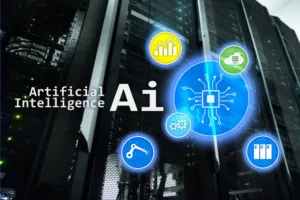Universal Basic Income:

The rise of artificial intelligence (AI) is a hot topic. From self-driving cars to automated customer service chatbots, AI is changing how we live and work. But with this change comes a big question: will AI take our jobs, leaving us with nothing to pay the bills?
What is Universal Basic Income (UBI)?
Imagine a world where everyone receives a regular, no-strings-attached payment from the government, enough to cover basic needs like food and shelter. That’s the basic idea behind Universal Basic Income (UBI). It’s not welfare or unemployment benefits. It’s a guaranteed income for all citizens, regardless of employment status.
Why is Universal Basic Income (UBI) being considered?
As AI continues to evolve, some experts predict widespread job displacement. Tasks that were once the domain of human workers, from factory assembly lines to data analysis, are increasingly being automated. This could lead to mass unemployment and social unrest. UBI is seen as a way to mitigate these risks by providing a safety net for those who lose their jobs to automation.
Read More: Unveiling the Potentials of Inspirit AI Technology
Is Universal Basic Income (UBI) science fiction or the future of work?

The idea of UBI might sound futuristic, but governments and economists around the world are seriously considering it. Here’s why:
i. Automation Anxiety: A major concern is that AI will automate many jobs currently done by humans. A 2017 study by Oxford University estimated that 47% of employment in the US is at risk of being automated in the next two decades. This could lead to widespread unemployment and economic hardship.
ii. The Changing Nature of Work: Even if AI doesn’t completely replace human workers, it will likely change the nature of work dramatically. New skills will be in demand, and some people may struggle to adapt. UBI could provide a buffer during these transitions.
iii. Inequality on the Rise: In many countries, income inequality is a growing problem. UBI could help address this by putting money directly into the pockets of those who need it most.
Benefits of Universal Basic Income (UBI): A Safety Net and a Springboard

Imagine a world where everyone has a basic income to cover their needs. This could lead to several positive outcomes:
i. Reduced Poverty: The UBI has the potential to significantly reduce poverty and homelessness. With a guaranteed income, people would have more security and stability in their lives.
ii. Increased Innovation and Entrepreneurship: Financial security could free people up to pursue their passions, start businesses, or take on creative projects. This could lead to a surge in innovation and entrepreneurship.
iii. Improved Well-Being: Financial stress can take a toll on mental and physical health. UBI could help improve overall well-being by reducing stress and anxiety.
iv. More Time for Caregiving and Education: UBI could allow people to take time off to care for loved ones or pursue further education without worrying about making ends meet.
v. Economic Stimulus: With UBI, people would have more money to spend, which could boost the economy.
vi. Increased Economic Security: With UBI, people wouldn’t have to fear financial ruin if they lost their jobs. This could lead to increased risk-taking and entrepreneurship.
Challenges of Universal Basic Income (UBI)
While UBI has many potential benefits, some challenges need to be addressed:
i. Cost: Providing a basic income to everyone would be expensive. Governments would need to find ways to fund UBI, potentially through changes to the tax system.
ii. Disincentive to Work: Some people worry that UBI could discourage people from working. However, studies on existing pilot programmes have shown little evidence of this [2].
iii. Public Perception: There may be resistance to the idea of a “free handout.” However, UBI can be framed as an investment in people and the economy.
iv. Implementation: Deciding who qualifies for UBI and how much they receive would be complex and politically charged.
v. Feasibility: The logistics of administering a large-scale UBI programme could be complex, requiring efficient government systems and robust anti-fraud measures.
Read More: How AI and the Metaverse are Transforming Our World
How Universal Basic Income (UBI) Could Work with AI
AI and UBI aren’t mutually exclusive concepts. Here’s how they could work together:
i. Taxing AI: These automated processes could bring in money that could be used to pay for UBI as AI takes over more jobs.
ii. Retraining and upskilling: UBI could provide a safety net while people are trained for new jobs in the AI-powered economy.
iii. Focus on Human Skills: With AI handling routine tasks, UBI could allow people to focus on developing uniquely human skills like creativity, critical thinking, and social intelligence.
The Global Conversation: Universal Basic Income (UBI) Pilots and Ongoing Debates
The debate surrounding UBI is ongoing, with pilot programmes being tested in various countries around the world. Finland conducted a two-year UBI trial from 2017 to 2018, with mixed results. While some participants reported feeling more secure and able to focus on job searches, the overall impact on employment rates was inconclusive.
Other countries, including Kenya and Namibia, have also implemented UBI pilot programmes. These experiments provide valuable data that can inform future UBI discussions.
The Human-AI Partnership: Exploring Alternatives and Planning for the Future

The future of work will likely involve a collaboration between humans and AI. AI can handle repetitive tasks, freeing humans to focus on more creative and strategic work. UBI could be a key component in this future, ensuring that everyone benefits from technological advancements.
Beyond UBI, other approaches are being explored to navigate the changing work landscape:
i. Skilling and Reskilling Initiatives: Governments and educational institutions can invest in programmes that equip workers with the skills necessary for AI-driven jobs. This may involve training in areas like data analysis, coding, and digital literacy.
ii. Shorter Workweeks: Some propose a transition to shorter workweeks, allowing more people to share available jobs. This could be coupled with increased automation to maintain productivity.
iii. Taxation on Automation: Taxes levied on companies that heavily automate their workforce could generate revenue to support displaced workers or fund social safety nets.
Ultimately, the best solution may involve a combination of these approaches.
Here are some key takeaways to consider:
i. Embrace Lifelong Learning: The future of work demands continuous learning and adaptation. Individuals should be prepared to acquire new skills throughout their careers.
ii. Invest in Education and Training: Governments and educational institutions need to prioritise programmes that foster skills relevant to the AI economy.
iii. Prepare for Change: Both individuals and policymakers should acknowledge the disruptive potential of AI and embrace proactive strategies to navigate this transformation.
Read More: 5 Essential Skills You Need To Become An AI Expert
Conclusion:
The rise of AI and automation necessitates a thoughtful discussion about the future of work. While AI poses challenges, it also presents opportunities for innovation and economic growth.
Universal Basic Income (UBI), though not a silver bullet, offers a potential approach to mitigate the negative impacts of automation. Whether UBI becomes a viable solution depends on overcoming funding hurdles, addressing logistical concerns, and fostering public acceptance.










